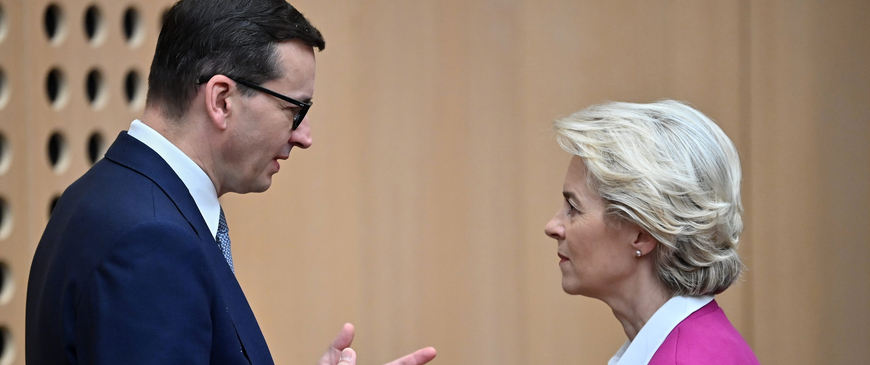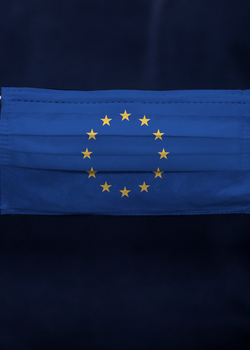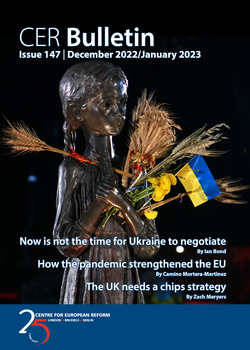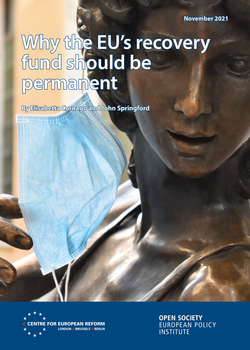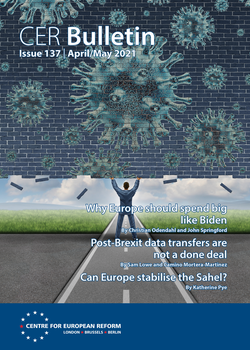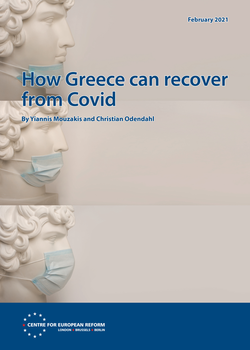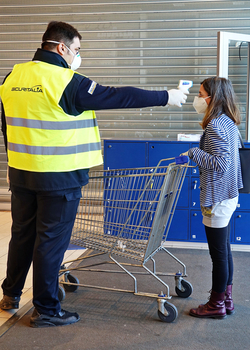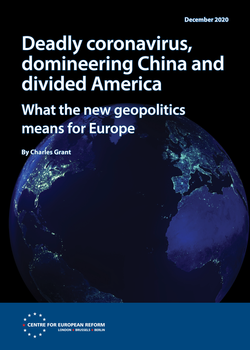Coronavirus
How the pandemic strengthened the EU
01 December 2022
The EU has tried for years to become more resilient to global shocks. The new European Health Union is a good start. But the world is changing fast.
Bulletin issue 147 - December 2022/January 2023
01 December 2022
- Now is not the time for Ukraine to negotiate, Ian Bond
- How the pandemic strengthened the EU, Camino Mortera-Martinez
- The UK needs a chips strategy, Zach Meyers
A permanent EU recovery fund can help Poland change
29 November 2021
The EU’s climate ambitions will add tension to its relationship with Poland. Making the EU’s recovery fund permanent would provide stronger incentives for Poland to embrace the energy transition.
Why the EU's recovery fund should be permanent: Country report - France
11 November 2021
[NAVIGATION]
COVID-19France has had one of the highest rates of COVID-19 cases and deaths in the EU, after three large waves in March and October 2020, and in the spring of 2021. Like most European countries, France provided a ‘chômage partiel’ furlough scheme for workers in businesses that were forced to...
COVID-19France has had one of the highest rates of COVID-19 cases and deaths in the EU, after three large waves in March and October 2020, and in the spring of 2021. Like most European countries, France provided a ‘chômage partiel’ furlough scheme for workers in businesses that were forced to...
Why the EU's recovery fund should be permanent: Country report - Germany
11 November 2021
[NAVIGATION]
COVID-19Germany locked down at an early stage of the first wave in March 2020, which meant that it suffered fewer hospitalisations and deaths than most other countries in Western Europe. Deaths in the autumn and winter waves of the disease were lower than its peers, too. Its fiscal response to...
COVID-19Germany locked down at an early stage of the first wave in March 2020, which meant that it suffered fewer hospitalisations and deaths than most other countries in Western Europe. Deaths in the autumn and winter waves of the disease were lower than its peers, too. Its fiscal response to...
Why the EU's recovery fund should be permanent: Country report - Greece
11 November 2021
[NAVIGATION]
COVID-19 While Greece managed to avoid a large first wave of Covid-19 infections by locking down early in spring 2020, it suffered from two further waves – and two further lockdowns – in November-December 2020 and in April-May 2021. Most activities re-opened in mid-May 2021.
In 2020, government support to the economy...
COVID-19 While Greece managed to avoid a large first wave of Covid-19 infections by locking down early in spring 2020, it suffered from two further waves – and two further lockdowns – in November-December 2020 and in April-May 2021. Most activities re-opened in mid-May 2021.
In 2020, government support to the economy...
Why the EU's recovery fund should be permanent: Country report - Romania
11 November 2021
[NAVIGATION]
The impact of the pandemic on RomaniaTotal cases per million of population have been comparatively low in Romania, while deaths have been around the EU average, at 1,700 per million. This is because cases have been undercounted and the health-care system has struggled to cope with the pandemic. Like many...
The impact of the pandemic on RomaniaTotal cases per million of population have been comparatively low in Romania, while deaths have been around the EU average, at 1,700 per million. This is because cases have been undercounted and the health-care system has struggled to cope with the pandemic. Like many...
Why the EU's recovery fund should be permanent: Country report - Italy
11 November 2021
[NAVIGATION]
COVID-19Italy has been among the European countries hardest-hit by COVID-19, having suffered a particularly harsh first wave in spring 2020. A nationwide lockdown was introduced on March 9th. Between mid-March and mid-May 2020, the government implemented a range of fiscal packages amounting to over €860 billion, covering support for businesses...
COVID-19Italy has been among the European countries hardest-hit by COVID-19, having suffered a particularly harsh first wave in spring 2020. A nationwide lockdown was introduced on March 9th. Between mid-March and mid-May 2020, the government implemented a range of fiscal packages amounting to over €860 billion, covering support for businesses...
Why the EU's recovery fund should be permanent: Country report - Portugal
11 November 2021
[NAVIGATION]
The impact of the pandemic on PortugalDeaths have been close to the EU average, at around 1,700 per million.1 Portugal locked down promptly in the first wave of the pandemic, but the country suffered further waves, with the peak of the pandemic coming in early February 2021, with over...
The impact of the pandemic on PortugalDeaths have been close to the EU average, at around 1,700 per million.1 Portugal locked down promptly in the first wave of the pandemic, but the country suffered further waves, with the peak of the pandemic coming in early February 2021, with over...
Why the EU's recovery fund should be permanent: Country report - Poland
11 November 2021
[NAVIGATION]
COVID-19 While the impact of the first wave of Covid-19 infections in spring 2020 was small in Poland, the country suffered from two large waves peaking in November 2020 and in May 2021.
The fiscal policy response in 2020 totalled 5.3 per cent of GDP and included numerous measures, from wage subsidies...
COVID-19 While the impact of the first wave of Covid-19 infections in spring 2020 was small in Poland, the country suffered from two large waves peaking in November 2020 and in May 2021.
The fiscal policy response in 2020 totalled 5.3 per cent of GDP and included numerous measures, from wage subsidies...
Why the EU's recovery fund should be permanent
11 November 2021
The recovery fund will raise growth, and member-states’ investments and reforms are largely the right ones. But to make a big difference to climate change, the fund needs to be permanent and much larger.
Why the EU's recovery fund should be permanent: Country report - Spain
08 November 2021
[NAVIGATION]
The impact of the COVID-19 pandemic on Spain As of July 2021, Spain had suffered over 81,000 confirmed deaths, with its worst wave in January 2021.1 Lockdowns were put in place in March-June 2020 and in October 2020-May 2021. This took a toll on economic activity, as GDP dropped by...
The impact of the COVID-19 pandemic on Spain As of July 2021, Spain had suffered over 81,000 confirmed deaths, with its worst wave in January 2021.1 Lockdowns were put in place in March-June 2020 and in October 2020-May 2021. This took a toll on economic activity, as GDP dropped by...
Bulletin issue 137 - April/May 2021
29 March 2021
- Why Europe should spend big like Biden, Christian Odendahl, John Springford
- Post-Brexit data transfers are not a done deal, Sam Lowe, Camino Mortera-Martinez
- Can Europe stabilise the Sahel?, Katherine Pye
Why Europe should spend big like Biden
29 March 2021
The scale of Biden’s spending plans means the US economy will recover much faster than Europe’s. Yet in many ways it is the European economy that is in greater need of stimulus.
The EU's troubled leadership: You get what you pay for
25 February 2021
Recent gaffes by Ursula von der Leyen and Josep Borrell, over COVID-19 vaccination roll-out and Russia policy respectively, have irritated member-states.
How Greece can recover from Covid
09 February 2021
The pandemic is adding to Greece’s economic problems. But the EU recovery fund, if spent well, offers Greece a chance to turn a corner.
An unequal recovery would be politically explosive
29 January 2021
When restrictions are eased, office workers will spend while poorer people, who have been more likely to get COVID-19, may struggle. Governments need to find ways to make the recovery fair.
Ditchley conference report: COVID-19, the global economy and the return of power politics
22 January 2021
At the CER's Ditchley economics conference, participants discussed the global role of the EU in the aftermath of the pandemic, with faltering trade and investment and growing strategic competition between the US and China.
Deadly coronavirus, domineering China and divided America: What the new geopolitics means for Europe
17 December 2020
Trump's presidency and COVID-19 have destabilised geopolitics, creating problems for the US and the EU, while strengthening China.
Brexit and COVID-19 are a toxic mix
15 October 2020
The second wave of COVID-19 is arriving just before the UK leaves the single market. The pandemic will make it harder for the economy to adjust to Brexit.


